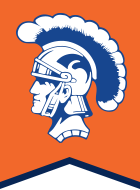FUFSD School Counselors Help Students Every Day:
- Assisting students in selecting courses that align with FUFSD goals, attributes and outcomes, commencement requirements, educational/career goals, teacher recommendations and parental approval.
- Career/Life education through classroom activities, community outreach and individualized counseling sessions.
- College/Career school planning and transition planning.
- College application process and Scholarship information.
- Facilitating relationships between students, teachers, parents, community members and administrators.
- Counseling for decision-making, goal setting and academic success.
- Function as part of the team in both 504 and Committee on Special Education meetings.
- Counseling in family and peer relationships.
- Counseling students with personal/emotional/social problems.
- Supporting the individual needs of each student.
School counselors assist students, teachers, parents and administrators. The role of the counselor is to help students as they seek to identify and achieve personal goals and assume rights and responsibilities in various life roles at each developmental stage. School counselors use three helping processes: counseling, consulting, and collaborating:
- Counseling is a complex helping process in which the counselor establishes a trusting relationship and focuses on problem solving, decision making, and discovering personal meaning related to learning and development, and career/life readiness.
- Consulting is a cooperative process in which the school counselor assists FUFSD stakeholders to think through problems and to develop skills that make them more effective in working with students;
- Collaborating is a leadership process in which the school counselor helps organize and coordinate the counseling program and related support services.
The following functions of the school counselor are developmental and impact all grade levels:
- Academic improvement and planning includes the selection of a plan of study, placement into appropriate courses and programs, attendance improvement, study skills development, as well as participation in the committee on special education process as appropriate.
- Personal/social growth includes counseling concerning self-esteem, communication skills, decision-making and relationship skills, as well as supporting DASA regulation and requirements.
- Crisis intervention services includes counseling students in crisis, e.g. suicide prevention, child abuse, pregnancy, substance abuse, and provide follow-up services as appropriate. The counselor plays an integral part in the crisis intervention team.
- Transitional services orients students as they move from grade to grade as well as from Golden Hill to S.S. Seward so as to provide a comfortable and success-oriented learning environment.
- Parent support includes individual conferences and group meetings with parents centered on the academic and personal growth of their children. This also includes the referral of students and parents to appropriate specials.
- School counselors assists teachers in enhancing the learning capabilities of students entrusted to their care.
- Career/life planning is a planning process that assesses a student’s goals, skills, knowledge, values, and interests to better focus the student to help them make better academic and personal documents by connecting those decisions with career goals and interests.
- Consultant includes serving as a reference and resource on student and school issues for the school psychologist, teachers, administrators, and the community, as well as, for local and state agencies, mental health offices/clinics and other professionals designated by parents and/or the school district.
- Sustains a program/service includes attention to many of the aspects listed here as well as personal growth, relational growth, career planning, and self-esteem building delivered through individual and group sessions.


